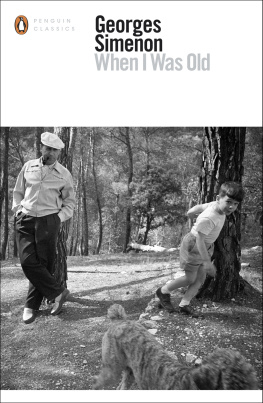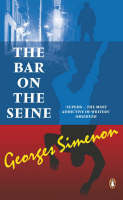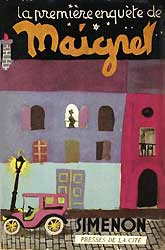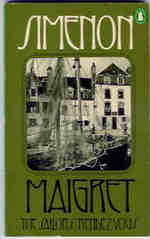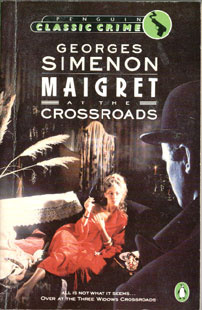Georges Simenon - When I Was Old
Here you can read online Georges Simenon - When I Was Old full text of the book (entire story) in english for free. Download pdf and epub, get meaning, cover and reviews about this ebook. year: 2016, publisher: Penguin Publishing Group, genre: Detective and thriller. Description of the work, (preface) as well as reviews are available. Best literature library LitArk.com created for fans of good reading and offers a wide selection of genres:
Romance novel
Science fiction
Adventure
Detective
Science
History
Home and family
Prose
Art
Politics
Computer
Non-fiction
Religion
Business
Children
Humor
Choose a favorite category and find really read worthwhile books. Enjoy immersion in the world of imagination, feel the emotions of the characters or learn something new for yourself, make an fascinating discovery.
- Book:When I Was Old
- Author:
- Publisher:Penguin Publishing Group
- Genre:
- Year:2016
- Rating:3 / 5
- Favourites:Add to favourites
- Your mark:
- 60
- 1
- 2
- 3
- 4
- 5
When I Was Old: summary, description and annotation
We offer to read an annotation, description, summary or preface (depends on what the author of the book "When I Was Old" wrote himself). If you haven't found the necessary information about the book — write in the comments, we will try to find it.
When I Was Old — read online for free the complete book (whole text) full work
Below is the text of the book, divided by pages. System saving the place of the last page read, allows you to conveniently read the book "When I Was Old" online for free, without having to search again every time where you left off. Put a bookmark, and you can go to the page where you finished reading at any time.
Font size:
Interval:
Bookmark:


UK | USA | Canada | Ireland | Australia
India | New Zealand | South Africa
Penguin Books is part of the Penguin Random House group of companies whose addresses can be found at global.penguinrandomhouse.com.

First published in French as Quand jtais vieux by Presse de la Cit 1970
This translation first published by Hamish Hamilton 1972
Published in Penguin Books 1973
This edition published in Penguin Classics 2016
Copyright Georges Simenon Limited, 1970
Translation copyright Helen Eustis, 1971
GEORGES SIMENON Simenon.tm
MAIGRET Georges Simenon Limited
Cover photograph Reporters Associes/Gamma-Rapho/Getty Images. Author photograph courtesy of Simenon.tm
All rights reserved
The moral right of the author and translator has been asserted
eBook ISBN 9781101991930
Version_1
Georges Simenon was born on 12 February 1903 in Lige, Belgium, and died in 1989 in Lausanne, Switzerland, where he had lived for the latter part of his life.
PENGUIN CLASSICS
I love reading Simenon. He makes me think of Chekhov
William Faulkner
A truly wonderful writer marvellously readable lucid, simple, absolutely in tune with the world he creates
Muriel Spark
Few writers have ever conveyed with such a sure touch, the bleakness of human life
A. N. Wilson
One of the greatest writers of the twentieth century Simenon was unequalled at making us look inside, though the ability was masked by his brilliance at absorbing us obsessively in his stories
Guardian
A novelist who entered his fictional world as if he were part of it
Peter Ackroyd
The greatest of all, the most genuine novelist we have had in literature
Andr Gide
Superb The most addictive of writers A unique teller of tales
Observer
The mysteries of the human personality are revealed in all their disconcerting complexity
Anita Brookner
A writer who, more than any other crime novelist, combined a high literary reputation with popular appeal
P. D. James
A supreme writer Unforgettable vividness
Independent
Compelling, remorseless, brilliant
John Gray
Extraordinary masterpieces of the twentieth century
John Banville
I only did what I could,
no more than I could
Claude Bernard (1878)
In 1960, 1961, and 1962, for personal reasons, or for reasons I dont know myself, I began feeling old, and I began keeping notebooks.
I was nearing the age of sixty.
Soon I shall be sixty-seven and I have not felt old for a long time. I no longer feel the need to write in notebooks, and those that I did not use Ive given to my children.
palinges, 24 December 1969

1960
Its been four days from the twenty-first since I finished a novel, my hundred-eightieth-and-some, which Id wanted to be easy. But the first day that I began to write it, towards the ninth or tenth page, I had the feeling that it was useless to try to go on to the end, that I wouldnt be able to make it come to life.
As I always am when Im writing, I was alone in my study, with the curtains drawn. I paced up and down five or six times, and if they hadnt seemed in some way human, I would have torn up those few pages and waited a few days before beginning another book.
That has happened to me two or three times in a year. This time, I began to sob. Then, without too much confidence, I went back to my typewriter. Now I think its the best of the Maigrets. I will know when I begin the revision. Since the Cannes Festival, Ive been wanting to write a novel that would be full of sunshine and tenderness. I had one in mind, with the characters and the background at hand. I only wrote three pages of that one. It wasnt about Maigret, and my principal characters were in their thirties. I suddenly realized that in Maigret et les Vieillards, which in a way replaced this abandoned novel, I expressed the same tenderness, put in as much sunshine, but with characters who were all between seventy-two and eighty-five years old
Well then! That isnt at all the kind of thing I meant to put in this notebook. But I must begin somehow. I have neither any intention of writing my memoirs nor of keeping a journal. Do I want somehow to arrest the flow of life from time to time? Not that either.
I believe that in reality its much more childish than that, that it stems from a time long ago. From the age of seven or eight, Ive been intrigued by paper, pencils, erasers, and a stationery store always fascinated me more than a candy store or a bakery. I loved the smell of it. A special kind of yellow pencil, too hard to be used in school, seemed to me more elegant, more aristocratic than anything I could think of. The same way with certain papers, for instance a drawing paper which was called, I think, Whatman paper and was used by those of my mothers boarders who were studying to be mining engineers at the university. They worked for three weeks or months on the same sheet. At the end, when all the tracings were retraced with India ink (the elegance, also, of those little bottles!) they washed the much-used paper like linen.
I suppose my passion for notebooks dates from that same period, not for my school notebooks which seemed childish to me, but for what were called student notebooks, square-ruled, fat, with a red top stain, bound in thick grey or tan canvas. I would slip into the students rooms to look at these, touch them. Nearly all of them were filled with tiny, scarcely legible writing, and scattered through them were geometric drawings for the science courses, or parts of the human body for medical studies.
I was about eleven years old, I think, when I finally bought my first student notebook, knowing as little as I know today (forty-seven years afterwards) what I was going to put in it. My name on the first page, of course. Then a few lines of verse, several quotations taken from the writers whom I was reading then. I probably filled three or four pages that way, with plenty of blank spaces between.
At fifteen, a new notebook, and this time the poetry in it was my own. Two pages of it at most.
Third notebook at twenty-one. This was the period when I was writing stories for newspapers. I wrote between three and seven a day, to make a living. In the evening, in my notebook, I wrote for myself. I remember twenty stories which I must have kept in some file, since after they were written I typed them up.
About the typewriter, it seems to me now that I, who so loved beautiful papers, notebooks in hard cover, pencils, pen-holders, began at the age of sixteen and a half to type because it was expected at the paper where I was a reporter. I got so used to it that for years, even decades, Ive been virtually incapable of writing by hand.
Font size:
Interval:
Bookmark:
Similar books «When I Was Old»
Look at similar books to When I Was Old. We have selected literature similar in name and meaning in the hope of providing readers with more options to find new, interesting, not yet read works.
Discussion, reviews of the book When I Was Old and just readers' own opinions. Leave your comments, write what you think about the work, its meaning or the main characters. Specify what exactly you liked and what you didn't like, and why you think so.

